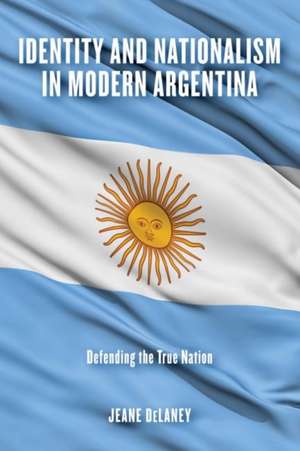Identity and Nationalism in Modern Argentina – Defending the True Nation
Autor Jeane Delaneyen Limba Engleză Paperback – 24 iul 2020
DeLaney connects the rise of Argentina's anti-liberal nationalist movements to the shock of early twentieth-century immigration. She examines how pressures posed by the newcomers led to the weakening of the traditional ideal of Argentina as a civic community and the rise of new ethno-cultural understandings of national identity. Identity and Nationalism in Modern Argentina demonstrates that national identities are neither unitary nor immutable and that the ways in which citizens imagine their nation have crucial implications for how they perceive immigrants and whether they believe domestic minorities to be full-fledged members of the national community. Given the recent surge of anti-immigrant sentiment in Europe and the United States, this study will be of interest to scholars of nationalism, political science, Latin American political thought, and the contemporary history of Argentina.
| Toate formatele și edițiile | Preț | Express |
|---|---|---|
| Paperback (1) | 362.71 lei 6-8 săpt. | |
| MR – University of Notre Dame Press – 24 iul 2020 | 362.71 lei 6-8 săpt. | |
| Hardback (1) | 700.91 lei 6-8 săpt. | |
| Wiley – 24 iul 2020 | 700.91 lei 6-8 săpt. |
Preț: 362.71 lei
Nou
Puncte Express: 544
Preț estimativ în valută:
69.43€ • 75.44$ • 58.36£
69.43€ • 75.44$ • 58.36£
Carte tipărită la comandă
Livrare economică 22 aprilie-06 mai
Preluare comenzi: 021 569.72.76
Specificații
ISBN-13: 9780268107901
ISBN-10: 0268107904
Pagini: 450
Dimensiuni: 153 x 229 x 27 mm
Greutate: 0.6 kg
Editura: MR – University of Notre Dame Press
ISBN-10: 0268107904
Pagini: 450
Dimensiuni: 153 x 229 x 27 mm
Greutate: 0.6 kg
Editura: MR – University of Notre Dame Press
Notă biografică
Descriere
Explores the origins and development of Argentina's two forms of nationalism by linking nationalist thought to ongoing debates over Argentine identity. Part I considers the period before 1930, examining the emergence and spread of new essentialist ideas of national identity. Part II analyses the rise of nationalist movements after 1930.
